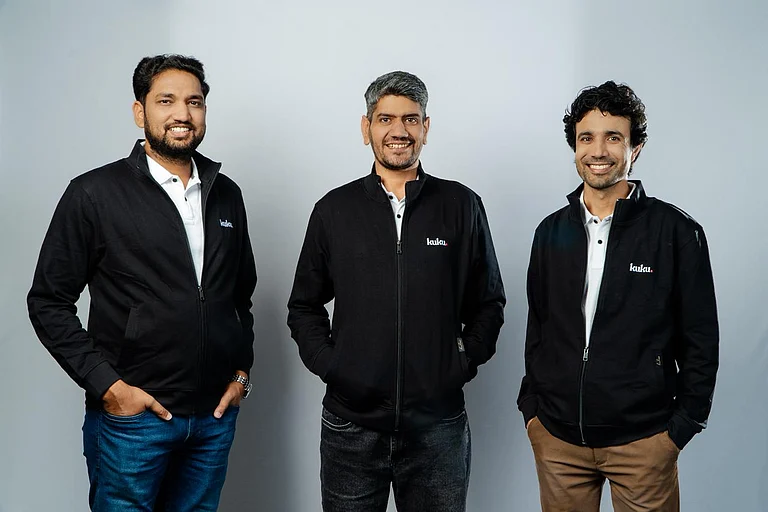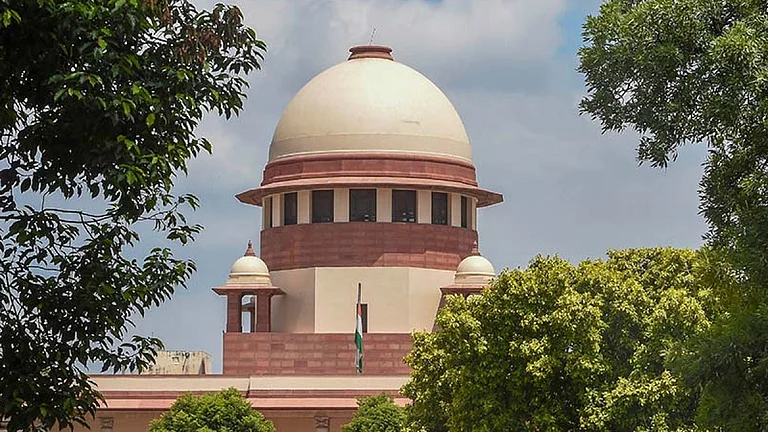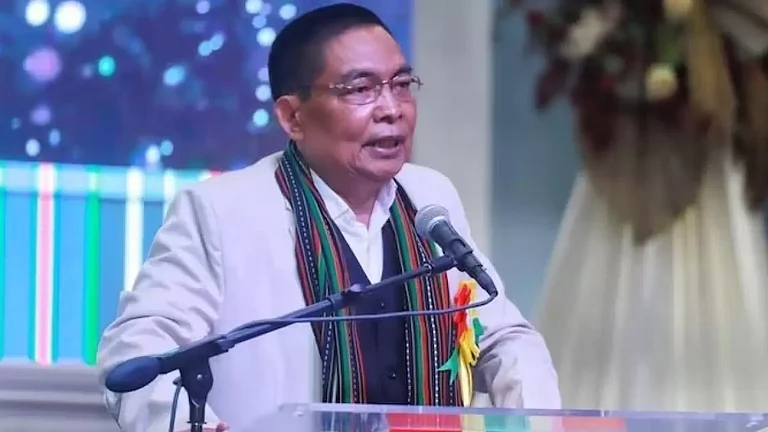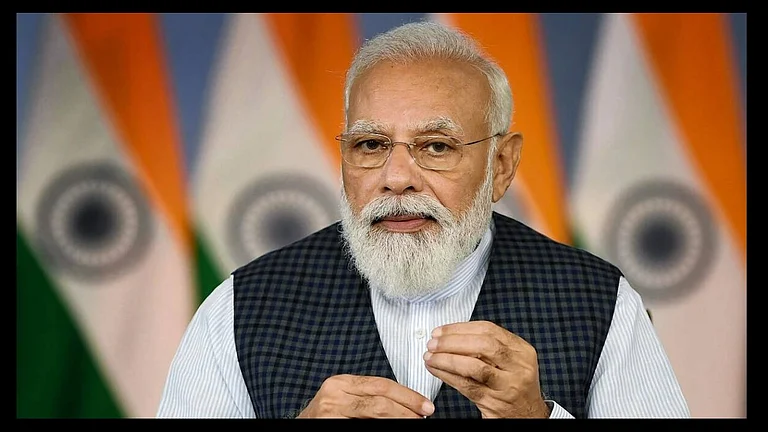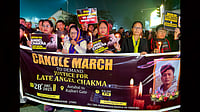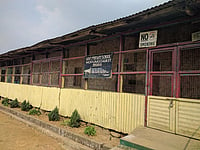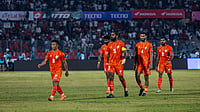On a quiet afternoon in Lamka, Churachandpur, a child taps into an app, types a sentence, and a soft, familiar voice speaks: “I am hungry. Can we eat now?” It is an ordinary moment, yet one that had never been possible before. For Patrick and thousands of non-verbal children like him, it marks the first time the world replies in a voice that sounds like their own. In Manipur, a state torn by conflict where leaders have gone quiet, and institutions no longer speak, a different kind of voice has emerged. It doesn’t come from the state. It comes from the community.
Now, one has arrived. My First Voice, a speech-generating app created by Monks India in collaboration with the Centre for Community Initiative (CCI), does something few institutions in this fractured state have managed. It restores connection not as a symbolic gesture but in the most literal way possible: by giving children the means to be heard in their own voice. This quiet intervention feels urgent in a region where political institutions have collapsed into noise or silence and where governance has retreated from public life. It does not pretend to resolve the larger crisis. But it begins in a place the state has long abandoned: care.
In the Silence of Collapse, a New Sound
Manipur today is a place where most institutions no longer speak with any moral clarity. Governance has receded. Civil society is fractured. In some districts, the internet has been gone for over a year. What remains is not lawlessness but a condition where institutions are mute, and silence has been institutionalized. In this climate, the emergence of My First Voice is almost disorienting, not because of its scale but because of what it does. It allows children who have never been able to speak to generate a recognizably their own voice, not robotic, not borrowed, not simulated. It listens to the child’s hums, fragments of sound, and unspoken effort and reconstructs from these a language that families can hear and respond to. The voice carries inflexion, rhythm, and memory. It is not generic AI. It is the restoration of presence.
The technology was developed by Monks India, a digital production agency, in close collaboration with the Centre for Community Initiative in Churachandpur. The process itself required resisting the shortcuts of standard speech synthesis. Datasets were gathered from parents and siblings, not to flatten identity into templates but to preserve its texture. Accent, tone, and the soft irregularities that define a person are all retained. Training time was cut down to minutes, but without sacrificing individuality. The result is a voice that feels inhabited.
None of this is abstract. One mother, for the first time, hears her child say, “I love you too.” What moves her isn’t only the sentence; it’s its sound. The voice feels real. It sounds like her son. It's not something the app created, not a generic voice, but truly his. In a state where politics has turned speech into accusation or silence, where the loudest voices often drown out the most urgent ones, this modest, almost private return of voice carries a different weight. It is not protest, but it punctures abandonment. It does not pretend to solve the crisis but insists on staying human inside it.
The Birth of CCI: From Personal Struggle to Community Strength
Pauzagin Tonsing never intended to start a movement. In 2005, when his son was born with irreversible optic nerve atrophy, he was just a father navigating darkness, literal and bureaucratic. There were no special schools in Lamka, no speech therapists, and no resources for parents of children with disabilities. “We dreamed of a place where we could send our children to learn and grow, just like everyone else’s,” he once said. That dream became the Centre for Community Initiative (CCI), which he founded in 2007 with other parents who refused to accept neglect as the norm.
From those humble beginnings, CCI has evolved into a comprehensive support system that now includes a day school (The Malsawm Initiative), early intervention units, home-based care, livelihood programs, and community-based rehabilitation services. Its guiding principle is deceptively simple: that every child deserves voice, dignity, and presence regardless of ability.
In August 2024, Tonsing was awarded the Times Now Amazing Indians Award for Education, a rare national recognition of grassroots excellence. The citation praised him for “transformative impact in disability education” and “establishing inclusive systems of care” where none existed. He has since served on the Manipur State Advisory Board on Disability and sits on district-level committees shaping health and education policies. The Zomi Students’ Federation called him a “source of profound pride,” lauding his work as a beacon for “the future of disadvantaged and less fortunate children.” But those who know him say he still shows up to work like any other teacher, fixing broken ramps, mentoring speech therapists, and listening to mothers.

CCI’s ethos is care without spectacle. It operates in the quiet register of slow transformation, rooted in Lamka but now resonating globally. In 2025, My First Voice—the organization’s flagship AI-powered speech app was selected for the ACT x CANNES platform at the Cannes Lions International Festival of Creativity. It was the only Indian project showcased among global entries, a rare acknowledgement that care, when rooted in context, travels far. Among high-profile global campaigns, this modest initiative from Manipur stood out, not by promising disruption or profit but by offering something rarer: the willingness to listen before speaking. But acclaim was never the goal. At home, the work continues, not in auditoriums but in homes, classrooms, and clinics. Monks and CCI continue to expand the app’s reach, not through spectacle, but by refining what matters most: a voice that feels like one’s own.
AI, But Grounded in Care
At first glance, My First Voice may seem like just another speech app. But it’s been designed for children who fall outside the reach of most mainstream tools, those who can’t type, who don’t form words in ways machines easily understand, whose sounds are often dismissed as noise. The team behind it, a collaboration between Monks India and the Centre for Community Initiative, had to begin not with code but with listening. The usual models of artificial intelligence weren’t built for this. They rely on clean data, data-structured sentences and clearly spoken words. However, many of the children at CCI don’t communicate that way. Their speech is layered with pauses, fragments, and irregular rhythms. “We couldn’t just plug their sounds into an existing system,” said John Paite, Chief Creative Officer at Monks. “It didn’t work. So we had to start from scratch.”
What emerged is a system that learns from the texture of a child’s sounds. Families provided recordings, simple murmurs, humming, and bits of speech from siblings, and from these AI stitched together a voice that felt deeply familiar. This wasn’t about simulating a voice but about recovering something the world had never heard in full. The app also anticipates the child’s everyday needs. It comes with commonly used phrases, simplified navigation, and language settings that reflect Manipur’s many tongues. Training the AI once took days. Now, it happens in minutes without losing the nuances that make each child’s voice their own.
The impact is quiet but undeniable. Tyson, a young boy at the school, burst into tears when he heard himself speak through the app for the first time. His mother said he wouldn’t stop showing it to others. Christie, another mother, said she used to hesitate before taking her son Patrick out in public. “People stared,” she said. “Now that he can speak for himself, even with a device, everything feels different.” What My First Voice offers is not a miracle of science. It is a slow, careful effort to meet children where they are on their own terms. It doesn’t promise to fix them. It helps the world hear them.
Why This Matters in Manipur Today
For over two years, Manipur has been torn apart by an ethnic conflict that has upended every part of life, burned through homes, schools, and any sense of shared belonging. Entire villages have been razed. Thousands have been displaced. Relief camps stretch across districts like a second, informal state. Schools have closed and reopened. Courts delay justice or look away entirely. Elected leaders visit only in convoys, if they come at all. Even the internet, something most of the world now takes for granted, can be shut down in an instant, depending on what the state decides is convenient. There is no normal to return to.
What has collapsed is not just governance but a sense of shared belonging. And in that vacuum, it is easy for some lives to disappear quietly, without outrage. Children with disabilities are among the first to be forgotten when systems fail. Their needs are rarely seen as urgent. Their silences are mistaken for absence. And so, their erasure becomes almost routine. This is what makes My First Voice more than a story about technology. It is not a gadget or an innovation hub showcase. It is a refusal by parents, educators, designers, and caregivers to let these children vanish. Their work holds the line between neglect and dignity in a landscape where the state has retreated.

The Centre for Community Initiative does not work in ideal conditions. Based in Lamka, a town severed by conflict and surrounded by uncertainty, their team operates in a reality where the state capital, Imphal, is no longer accessible by road or trust. What should have been a one-and-a-half-hour journey now feels like crossing an invisible border; supplies are stalling, and coordination is broken down. There is no guarantee that appeals to the government will even be read, let alone answered. And yet, amid this fragmentation, CCI has built an infrastructure that holds. Not with concrete or authority, but with care, a different kind of infrastructure that can’t be bulldozed. A kind of slow, committed attention that outlasts headlines and official silence.
In times of war or collapse, the instinct is to wait for normalcy, for ceasefires, for government action. But CCI does not wait. It builds. It listens. It gives children the words they never had and lets them speak into a world that had written them off. In doing so, it reminds us of something we keep forgetting: that survival, in the end, is not just about staying alive. It’s about being seen, being heard, being held in the memory of a society that refuses to forget its most vulnerable.
Listening as a Political Act
In today’s Manipur, speech has become fraught. It is shouted across barricades, buried under bans, or simply withheld out of fear. The loudest words often do the least healing. And in this noise, My First Voice does something rare. It brings back a kind of speech that doesn’t demand power or provoke fear. A child saying, “I am here.” A mother hears it and answers. Nothing more. And yet, everything. We often ask whether technology can help the marginalized. The question is usually met with scale, efficiency, and ambition. This project offers something quieter. It does not generalize. It listens. It does not ask the child to fit into its system. It shapes itself around the child. And in doing so, It contends for a more profound concept of care in addition to inclusion.
What My First Voice restores is both communication and attention. In a place where institutions have failed, where the machinery of the state speaks in bulletins and blockades, this small app becomes something more than software. It reminds us that dignity begins with being heard, peace begins with presence, and even in the ruins of a broken state, it is still possible to build something that holds. And maybe that is enough for now, not to fix everything, but to hold space for those who were never meant to be part of the conversation. To let them speak in their own and to remind the rest of us: listening is the first act of repair.







